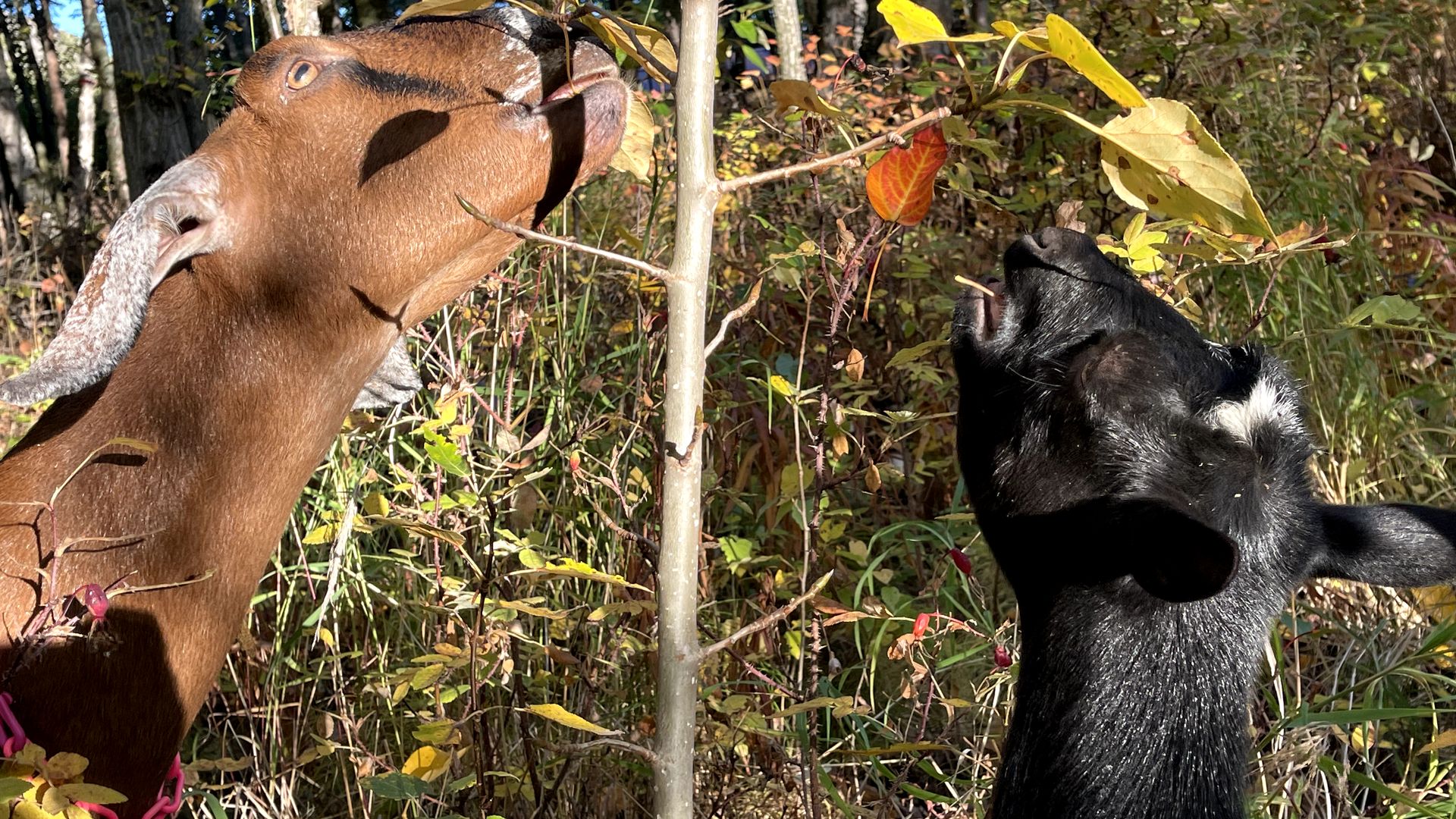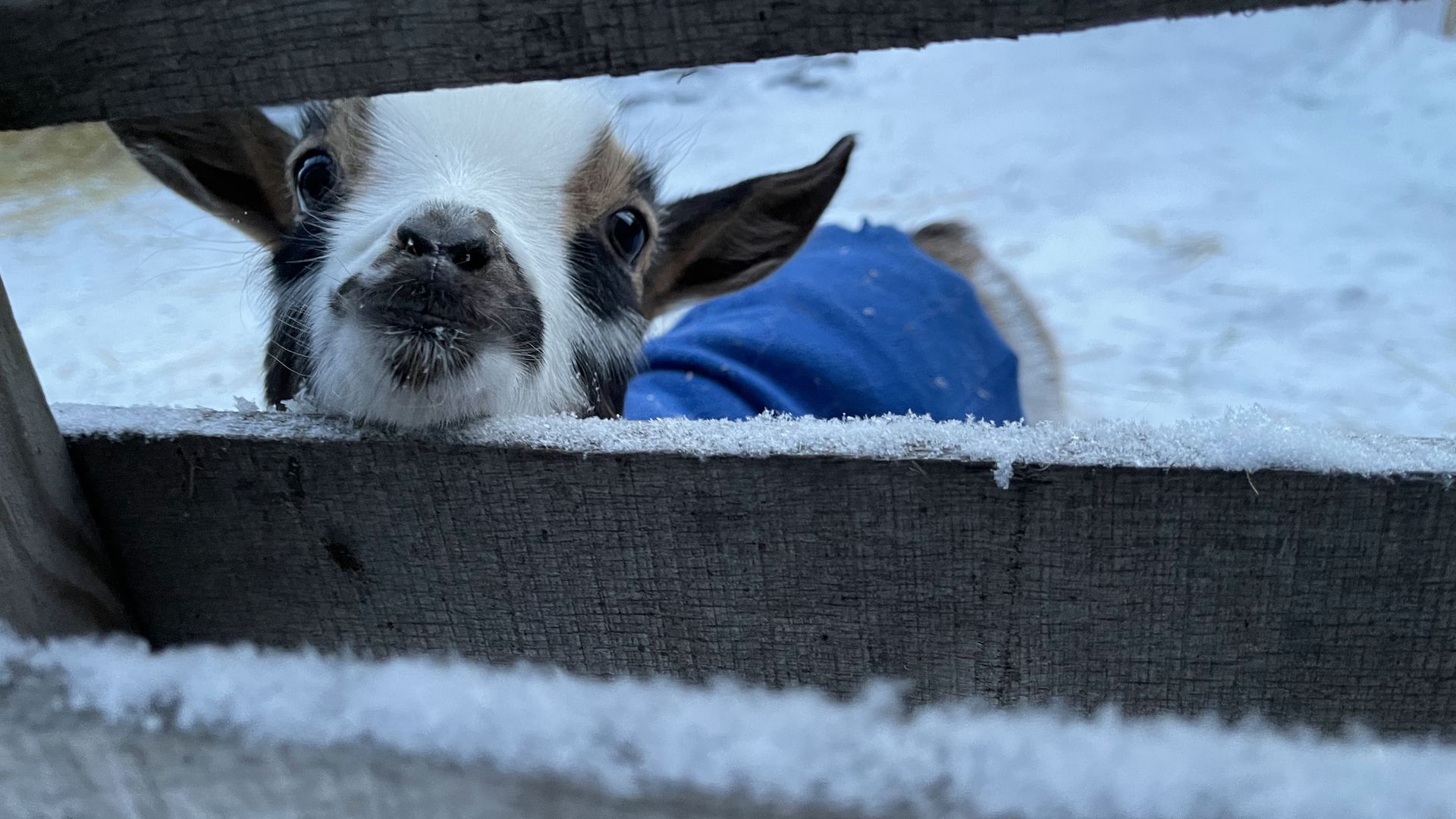Linear Appraisal in the Last Frontier: Planning a Special LA Session for Alaska
March 6, 2024 by Debra L.
This article was published in the March 2024 Newsletter of the American Nigerian Dwarf Dairy Association:
Alaskan dairy goat breeders have many challenges in raising and breeding dairy goats. Other than the state fairs, there are no other goat shows, active breed clubs, etc. Many breeders periodically bring in outside genetics from herds across the US, but there is not a great way to prove out those genetics aside from participation in ADGA Performance Programs. In the fall of 2023, a group of 4 Nigerian Dwarf breeders scheduled a special Linear Appraisal Session with ADGA. Three of the four herds had already been on milk test, had animals on the ELITE list and had descendants from top 10 does, but none of us had ever been appraised. Prior to 2023, the last appraisal session/ADGA show in Alaska was in 2018.
Since Alaska does not have an “active” ADGA group and herds are spread out over a large area, a regular LA stop is not feasible. In the past, local breeders have done a special LA session in conjunction with a sanctioned show. Breeders would look at which appraisers were also current ADGA judges and then hire them for a show. Once securing the judge, the breeders would work with the Performance Programs Manager (PPM) to add on a special LA session.
There are definite cost benefits to doing a show/special LA session together. For instance, if you are hiring a judge, you can use airline miles to help pay for airfare and book hotels that are convenient and economical. For LA sessions, the travel, hotel, car, etc. is booked by ADGA and you cannot use airmiles. If hiring a judge for a show, the show and appraisal cannot occur on the same day. For our session, we worked closely with the PPM in planning a trip. The PPM was very open to suggestions like using Turo instead of traditional car rental. There were unique challenges in this session as one herd, Alaska Wild Acres, is only accessible by boat. The owner, Tabitha Nelson, had to pick up the appraiser in the closest city (Petersburg) and bring him to her property which is a 30-minute boat ride each way.
ADGA charges a flat fee per day (daily rate) for Special LA Sessions in addition to airfare, hotel, car rental and per diem. The amount will vary greatly depending on your location, time of year, etc. Our appraisal was from 8/22-8/25/2023. To give you an idea of the schedule:
Our appraiser traveled from Portland, OR to Petersburg, AK on the first day. Due to lack of flights, the appraiser stayed a night in Petersburg and flew into Anchorage the following day. Once reaching Anchorage, the appraiser stayed a night there, and then traveled an hour away to Palmer, AK to start the appraisals of the remaining 3 herds. Laura Distler of Built With Earth Homestead, packed up her milking does and traveled 4+ hours from Kasilof to Palmer by 8am. Laura’s herd was appraised first at my farm in Palmer, AK. Afterwards, she loaded up her does and drove back another 4+ hours! Once the session in Palmer was completed, the appraiser drove to the last herd to be appraised, 8 Stars, in Chugiak, AK owned by Rayna Morgan. The appraiser was able to complete the 3 herds in one day and could then catch a flight back out of AK.
We had a few travel days on either side of actual scoring days, but the total cost was less than we anticipated. There was a total of 57 animals scored in the special session and it worked out to roughly $58 per goat. ADGA gave us an estimate of our fees and required a 50% deposit prior to scheduling the flights, etc. Once appraisal was completed and all the final costs were tabulated, we received an invoice for the remaining fees (we came in almost $300 under initial estimate).
After the appraisal, we exchanged all our LA scores on an EXCEL spreadsheet, so that we could see what other “local” herds had to offer. It was an excellent learning opportunity for all of us. We hope to plan another session for 2025 and get more herds involved to help reduce overall costs.
Making improvements in your herd can be challenging especially when you lack the access to shows and frequent appraisal. If you live in a remote/rural area and want to have your herd appraised, reach out to local breeders and then discuss with ADGA PPM on the possibility of getting a special session in your area. You can search out ADGA members in your state by utilizing the ADGA Membership directory and start garnering interest. It will likely not be within the prime scoring season; however, the information is still invaluable. Don’t worry about having to clip your does for appraisal or having them “show ready”. That is simply not feasible in northern climates where the does are growing in their much-needed fuzzy winter coats. Most of our does were stale and some were dry. My highest scoring doe was actually dry but had enough udder tissue that she could be scored. I had other dry does that did not have enough udder tissue to get an appraisal, but I still was able to get scores on their individual traits. This appraisal session was an invaluable tool to all of us and will help us develop our herds in the future.
-Debra Lucero
Anatevka Farms
For more information about the herds and genetics that Alaskan breeders have to offer, feel free to check out the FB and websites of the herds that participated in LA.
8 Stars (Chugiak, AK)
8starsgoats@gmail.com
Alaska Wild Acres (Petersburg, AK)
http://www.alaskawildacres.com
or follow on FB
Anatevka Farms (Palmer, AK)
https://anatevkafarms.com
or follow on FB
Built With Earth Homestead (Kasilof, AK)
http://builtwithearth.com
Or follow on FB
What We Feed Our Goats
January 8, 2023 by Debra L.
Feeding program
Feeding dairy goats can be complicated. Since we have been on milk test, we have tried to tweak our feed program, so that our does perform well. Then our focus changed. We want others to be able to replicate our feeding system when they purchase animals from us, so we decided to simplify our feeding program with feed/supplements that can be purchased within our area. Our program might not work for everyone, but it seems to work for our goats. There are many different feeding strategies-please consult your veterinarian on the best feeding program for your goats.
Water: Having clean, fresh water available to your goats is extremely important. We refill buckets several times per day. During the winter, we bring out buckets of warm water and in summer, ensure that cool water is available. On hot days, we also will add another bucket of water with Goat Bluelite, or as we like to call it- goatie Gatorade.
Hay: Our goats eat a base ration of local brome hay. All our goats have access to unlimited amounts of brome hay 24/7. We have had to source from several different local farms from the Matanuska Valley to Delta Junction. In addition to the brome, our does receive compressed alfalfa hay and/or alfalfa pellets. We feed alfalfa to all our does. During winter when the herd has decreased milk production, or we have does drying off, we feed less alfalfa. For those that will be doing extended lactation, we also feed alfalfa pellets on the stand, so we can meet the doe’s individual needs.
Grain: All our goats from kids to bucks, and milking does receive Purina Goat Chow. This is an all ages and stages feed and can be found at 2 local stores in Palmer and Wasilla.
- Goat kids first get exposed to grain when they are with their dams and then get fed a small ration at a few weeks of age. The goat kids get no more than ¼ cup once or twice per day depending on age.
- Dry yearlings are fed a small amount (¼ cup or less) of Purina Goat Chow on the milk stand along with brome hay pellets to acclimate them to the stand.
- Does in milk receive a base ration of Purina Goat Chow- approximately ½ lb at each feeding (twice daily). Depending on the body condition of doe, stage of lactation, etc. we adjust that amount up or down.
- Bucks receive a small amount of grain year-round, but we increase to ½ cup twice daily when the bucks are in rut to keep up their body condition (approximately August-January).
Other supplements- Depending on the goat, we like to give them extra “treats” on the stand. Some of the goats are pickier than others, but we offer small amounts (1T- ½ cup) of the following: shredded beet pulp (dry), black oil sunflower seeds (BOSS), whole oats or barley (depending on availability) and 1 T of calf manna. Each goat has their own likes/dislikes depending on the season, so this changes for each doe.
New Website Launched
December 27, 2022 by Debra L.
Please bear with us as we launch our new website. Some content and sections of the website may be incomplete. If you have any questions please use the contact form on our contact us page.

